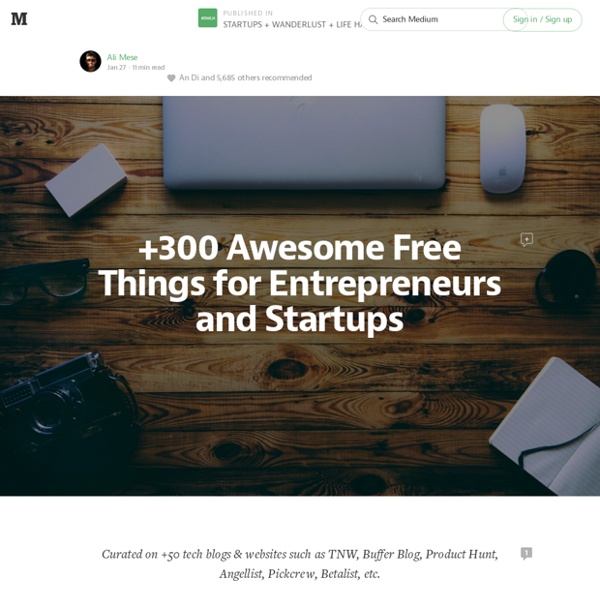



Steward - Sales Research Done On-Demand The Complete Startup Toolkit (The Best Free Online Startup Resources Right Now) — Tools And Apps Starting a business is hard. It’s even a more difficult when you don’t have the right startup resources, tools and business apps to do what needs to be done in time. Entrepreneurs do everything they can to get their businesses to succeed. What startup founders really need are the best startup resources and tools to help them get out there to build and sell their products and services. This is an awesome curation of the best online resources and tools for startups, originally curated by Ben Tossell, Community Manager at ProductHunt 1. 2. 3. 4. 5. 6. 7. 8. 9. 10. 11. rrrepo –Curated directories, for everything 12. 13. 14. 15. 16. 17.
Enterprise Sales Guide What tools do you use to monitor buzz about your startup? - Quora Groove Small Business Stack 90 days free Zapier gives you internet superpowers to get work done. Easily connect and integrate over 250 of the most popular web services to save you time, money and earn back your freedom. 90 days free Figure out what people are doing on your website! The confetti and heatmap features are simple and affordable heat mapping tools to visually understand user behavior. 50% off for 3 months after trial Build, publish & A/B test landing pages without I.T. The landing page builder for marketers. 90 days free Planscope helps freelancers and teams manage their client projects. We make it easy to answer, “Will this project get done on time and in budget?” 15% discount iDoneThis is the easiest way to keep your team in sync.
18 Extraordinary Lessons Learned from Interviewing The World’s Top SaaS Entrepreneurs We’ve learned a lot from businesspeople at the top of their game. Here are some of the biggest takeaways. Six months ago, we launched a new series on this blog. We set out to interview successful entrepreneurs – businesspeople at the very top of their game – about how they took their businesses to $100K in monthly revenue… and beyond. I expected it to be successful. After all, it was exactly the sort of thing I craved: the most valuable lessons from the entire careers of people much more successful than me, condensed into an easily readable format. But I didn’t expect it to have such an impact on our own business. The truth is, we’ve taken key insights from the monthly interviews, and applied at least one from each entrepreneur to Groove… and the results have been incredible. Today, I’m sharing the top takeaways for us (yours might be different, which is why I encourage reading all of the interviews in their entirety) from the six interviews we’ve done so far. 1) Have a “Forever Free” Plan
Startup Best Practices #11 - The 9 Box Matrix Talent Model McKinsey developed the 9 Box Matrix in the 1970s to help GE prioritize investments across its 150 business units. Not all business units were equally attractive. Some should receive investments and others should be divested. The 9 Box Matrix evaluated business units on two dimensions: industry attractiveness and competitive strength of the business unit. At some point in the last 40 years, Human Resources teams co-opted this model as a talent management tool, and replaced the two industry axes with people specific ones: performance and potential, as depicted above. First, the company categorizes all their employees into these buckets. Next, the management team meets to calibrate their categorizations. Last, the management team implements a talent plan which invests in the four top right boxes and includes training, mentorship, assigning new projects and retention compensation. Like most frameworks, the 9 Box Matrix is a simplifying tool for clarifying a process.
Mechanizing business development with social media Last year, I set a goal of adding 100 followers each week starting at 2000. I crossed the 3500 follower mark on Twitter this week. I’ve fallen a bit behind that goal but I have a wonderful group of people who actively engage with me on Twitter who are interested in the same things I am. As I’ve been cultivating this audience and community, I kept asking myself a question: who are most of these followers? I’ve looked for solutions to help me solve this problem.
2014 SaaS Survey (Part 1) - A Survey of key metrics in over 300 SaaS companies For the third year in a row, we worked together with Pacific Crest Securities, an investment banking firm with a specific focus on SaaS, to survey 306 SaaS companies. This represents nearly double the # of respondents from last year, giving us deeper benchmarking data and insights to share on the growth and operations of the companies in this space. We also welcome this year the participation of OpenView, an expansion stage venture capital firm specializing in B2B Software, who brought additional support. I want to extend my personal thanks to the many readers of this blog who participated in the survey. My thanks also go out to David Spitz and his team at Pacific Crest Securities (@dspitz and @PacCrestSec, respectively on Twitter) for their hard work on the survey. Part 1 of the results of the survey, which focuses on growth rates and go-to-market trends, are posted below. Info about the Survey Participants A larger, more diverse group of SaaS companies participated this year:
The Angel VC